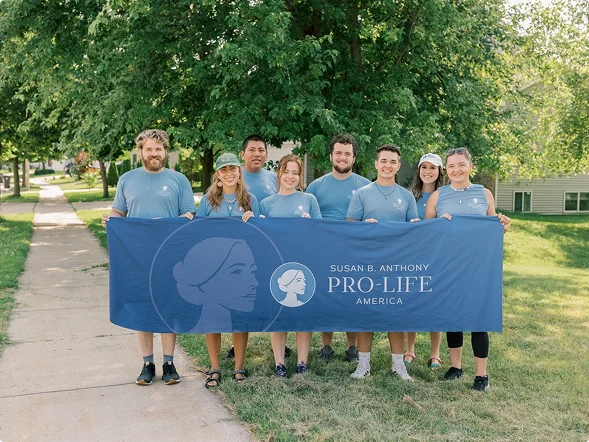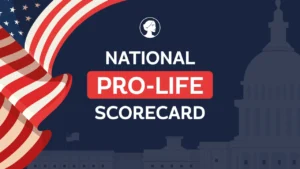The Med Ed Efforts in FL, TX and Beyond to Protect Women’s Lives

Wednesday, May 1, 2024. This is the date Florida’s heartbeat law went into effect to protect 50,000 lives annually after being put on hold for more than a year by litigation. This is also the day the Florida Agency for Health Care Administration (AHCA) announced a rule clarifying that women who experience an emergency during pregnancy will continue to have access to lifesaving care in the state.
Following the state Supreme Court decision to uphold Florida’s pro-life law in April, the abortion lobby sowed doubt over a pregnant woman’s ability to receive emergency care. Laura Goodhue, a Planned Parenthood employee called the heartbeat law “a public health crisis.” State Sen. Lauren Book said on TV prior to the law taking effect “women and girls will die.” And Democrats put up billboards claiming that women cannot get the care they need in Florida ERs.
AHCA Secretary Jason Weida said the rule was intended to protect women from this harmful misinformation. “The attempts to demonize standard healthcare for women make a physician’s job more difficult and can put a pregnant woman’s life at risk,” Secretary Weida stated on X.
Despite every pro-life law allowing emergency care for pregnant women, it’s a prevalent talking point all throughout the country amongst Democrats – and a talking point that polls much better than the Democrat stance for all-trimester abortion (which only 10% of Americans support). This is why Joe Biden’s recent ad on Arizona’s life at conception law included the line: “Women’s lives are in danger.”
In addition to Florida, other states like Texas have pursued their own ‘Med Ed’ solutions to stop the abortion lobby misinformation from confusing doctors and harming women.
Here’s what you need to know about the Med Ed efforts in the states:
Florida
The AHCA rule calls on hospitals to write policies for doctors who act under the heartbeat law’s ‘life of the mother’ provision and includes examples of conditions that can require immediate treatment such as premature rupture of membranes (PROM), ectopic pregnancy, and trophoblastic tumors. The agency also released a fact sheet to clear up misconceptions of the heartbeat law. The fact sheet says the law does not prevent women from receiving lifesaving care or treatment in an emergency which could cause “irreversible physical impairment of a major bodily function” in any way. It also states miscarriage and ectopic pregnancy care are unaffected.
Texas
In March, the Texas Medical Board announced it would move to adopt rules to protect women under the state’s life at conception law. The board held a hearing and listened to hours of public testimony. SBA Pro-Life America Midwestern Regional Director Sue Liebel was present to emphasize that Texas law is clear in allowing women to receive the proper care and there is a need for a rule to educate doctors.
Liebel said in a press release: “We know doctors by-and-large understand this because the state’s abortion data shows that abortions under the life of the mother provision have continued at the same rate each month post-Dobbs. Unfortunately, there have been instances where the lies of the abortion lobby and misleading headlines from the media have caused confusion for doctors.”
During the first week of May, SBA Pro-Life America and the Charlotte Lozier Institute submitted written comments emphasizing the importance of doctors relying on their “reasonable medical judgment” and that the law does not require a health emergency to be immediate for a doctor to act, but that it allows for intervention when a serious situation is foreseeable.
In the comment from the Charlotte Lozier Institute, Dr. Ingrid Skop, M.D., FACOG, and a practicing OB-GYN in Texas, wrote:
“Texas law does not require that a mother’s risk of death or ‘serious risk of substantial impairment of a major bodily function’ be immediate. . . Physicians understand that it is difficult to predict with certainty whether a situation will cause a woman to become seriously ill or die, but all physicians know what situations could lead to these serious outcomes. At the time of diagnosis of a potentially life-threatening pregnancy complication, a physician must be reassured that the law allows intervention.”
South Dakota
In March, South Dakota became the first state in the nation to establish a Med Ed law to end the confusion caused by the abortion industry through direct education to medical professionals. Sen. Erin Tobin summarized the bill in her remarks on the Senate floor, saying:
“Our laws have always allowed moms to receive treatment for miscarriage or ectopic pregnancy, as well as lifesaving care and medical emergency, and they still do. . . HB 1224 is an actual way to battle misinformation in the state of South Dakota. We as legislators representing mothers, babies, and families can make sure our trigger law is understood by all and allow comfort and reassurance as we grow our families and communities.”
Under South Dakota’s HB 1224, training materials will be established through the Department of Health and with input from the attorney general, medical professionals and legal experts. The video will cover the details of the state’s abortion law, the most common medical conditions that threaten the life or health of a pregnant woman, the standards of care for treating a pregnant woman in a medical emergency, and a practitioner’s ability to use reasonable medical judgment in all situations.
Nebraska, Oklahoma, and Kentucky
In addition to Florida, Texas, and South Dakota, other states have taken similar Med Ed steps administratively. Nebraska created guidance for the Let Them Grow Act, and Oklahoma and Kentucky attorneys general issued advisory opinions.
Republican or Democrat, pro-life or pro-choice – Med Ed policies have broad support. In South Dakota, the Med Ed bill was bi-partisan legislation with a Democrat co-sponsor and the ACLU was the only entity to testify against the bill during its committee hearings. Clarity on our laws for the sake of protecting women is something we can all get behind, and an approach more pro-life states should consider.
Make your gift to serve women and save babies today.
SBA Pro-Life America's mission is to end abortion by electing national leaders and advocating for laws that save lives, with a special calling to promote pro-life women leaders. Your secure gift today will help to advance a culture of life and protect unborn children and their mothers from abortion.
Donate


















